The Freedom and Beauty of Assembly: Ethical Humanists Strive to Reclaim Democracy For All
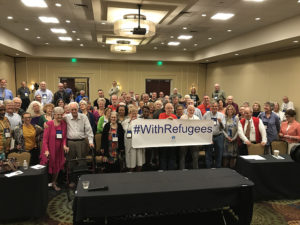
To a more perfect union we aspire
and lift our voices from the fire.
These are the closing words of Jean Rohe’s “National Anthem: Arise! Arise!,” which was proudly sung on the last day of the American Ethical Union’s 104th Assembly held in Tampa, Florida, June 20-23. The song—written by award-winning artist (and former president of the Brooklyn Society for Ethical Culture) Rohe—fit perfectly with the conference theme: “Reclaiming Democracy for All.”
Attendees were reminded that government fails to serve its populace when it marginalizes communities, suppresses voting, and prioritizes corporate interest. Democracy is for and by the people. It must recognize each person’s worth and dignity in order to ensure that all are equally represented and protected. Democracy, like humanism, requires people to take responsibility for their actions and strive to work together in the interest of society as a whole.
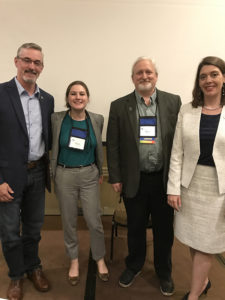
David Williamson, Sarah Levin, Ron Millar, Florida Rep Jennifer Webb
Workshop attendees were encouraged to incorporate the democratic process throughout their lives. For personal relationships, presenters focused on healing from political divide, listenawing to understand others, and the perspectives of Generation Z on needed changes in humanism. For local humanist groups affiliated with the AEU—often referred to as Ethical Societies—presenters reviewed democratic theory, the sanctuary model to resolve conflicts, and how groups can educate people on social justice issues and activities. For the global community, presenters spoke about the separation of church and state, corporate constitutional rights, and reproductive rights.
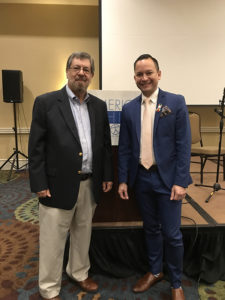
Keynote speakers Howard Simon & Florida Rep Carlos Guillermo Smith
The Center for Freethought Equality (CFE) hosted a panel on “Engaging Your Group—and You—in Electoral Politics” to inspire attendees to become more politically active as individuals and groups. CFE’s Ron Millar opened the workshop by reflecting on how Felix Adler founded the Ethical Culture Movement in 1876 to involve people in societal issues like improving education, housing, fair worker treatment, and equality. Panelist David Williamson of the Central Florida Freethought Community—a local affiliate of the American Humanist Association—shared how his group provides secular invocations, programming on ethical issues, and opportunities to connect with local politicians. And Sarah Levin of the Secular Coalition for America discussed how the Secular Values Voter campaign educates religious and non-religious people about the values we share and how to put those values into action. Millar then invited those of us in the audience to run for office, encourage our group members to run, speak up about secular values to our legislators, and support non-theist candidates. Jennifer Webb, Democratic Florida state representative and nontheist activist, spoke directly to how essential individuals and local groups were to her successful campaign and current work in office.
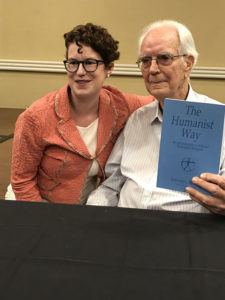
Amanda Poppei & Edward L. Ericson (holding his book The Humanist Way)
Rep. Webb was one of two CFE-endorsed LGBTQ Florida state representatives at this year’s AEU Assembly; the second was Democrat Carlos Guillermo Smith, who was welcomed with enthusiastic applause upon introducing himself as “a proud progressive, feminist, queer, Latinx, agnostic, millennial Democrat.” He spoke of how the Tallahassee voucher system is funneling billions of taxpayer dollars into religious schools that punish LGBTQ students more severely than other students who are caught lying, cheating, and stealing. He encouraged us to speak out against the religious right’s attempts to “plant seeds of hate in students’ minds.”
Howard Simon, former executive director of the American Civil Liberties Union of Florida, praised Rep. Smith’s work before taking the stage for his portion of the keynote program. Simon spoke of his decades-long dedication to restoring the right to vote for Floridians and beyond. He led the ACLU’s efforts to end Florida’s Civil War-era system of lifetime felony disfranchisement, helping secure passage of Amendment 4, which restored the right to vote to those with a felony conviction who’ve completed the terms of their sentence. This was especially interesting to attendees, as the AEU was considering a resolution on protecting incarcerated people’s right to vote (the resolution was passed on June 23).
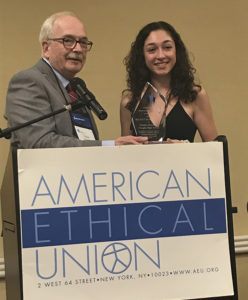
AEU former President John McCormick presenting Elliott-Black Award to Lea Serrano of Marjory Stoneman Douglass High School
Society volunteers were recognized during the Anna Garlin Spencer Awards lunch, at which Ethical Culture Leader Edward L. Ericson accepted the Felix Adler Lifetime Achievement Award. The 2019 Elliott-Black Award was presented to Marjory Stoneman Douglas High School for their courage in response to the tragic 2018 shooting there and for inspiring needed activism on gun violence, mental health, education funding, and safety. We were honored to hear from student Lea Serrano and teachers Dr. Jacob Abraham and Kimberly Krawczyk about life before, during, and after the deadliest school shooting in US history. We grappled with the fact that if students have better access to treatment and proper education instead of an assault weapon, this kind of tragedy—and many others—could be prevented. If society didn’t consider violence as a viable solution, think of all that we could accomplish together.
Over the years, attendees often note that AEU Assemblies are packed full of issues to cover, people to meet, and actions to take. This is also true of the local Ethical Societies that gather weekly to learn and grow together. Similarly, our nation’s democracy provides many opportunities for us to ensure that it properly serves its people. As George O’Dell, former Ethical Culture Leader of the Ethical Society of St Louis, wrote:
Democracy is something more than a pulling of a lever in a polling booth. It means the appeal to think in social terms, to belong consciously in a community, to share intelligence with others, to do one’s work in the world so as to enhance the working power and achievement of others, to recognize that class barriers and economic distinctions are an insult to the human soul, that in all persons there is the possibility of decency.
